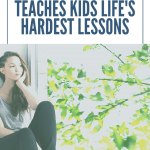How a Parent’s Death Teaches Kids About Life’s Greatest Lessons

Short and Sweet Summary: Our kids are learning life’s greatest lessons at an earlier age than most. Although we’d love to protect our kids from heartache and pain, adversity really does breed character. Bad things happen to good people all the time. We can’t prevent the hardships in our lives but we can decide how to react. Like refusing to become victims.
When my youngest son was in elementary school, I don’t remember which grade, they read the book Alexander and the Terrible, Horrible, No Good Day by Judith Viorst. The book describes several incidents Alexander endured throughout this horrible day. The students had to write a story about their own most terrible, horrible, no good day. When I read my son’s paper, he described the time his brother pushed him down the stairs.
“What are your talking about?” I asked. “Your brother never pushed you down the stairs like this. Is there something I don’t know about?”
“Well, mom, I couldn’t think of a terrible, horrible, no good day, so I had to make something up,” my son replied.
To be honest, the emotional side of me was happy that my kid led a stress-free life, but the other, more logical, side of me was horrified. I questioned how my kids would ever build character if they never suffered any adversity?
How could I make sure I didn’t provide too much, extend too much, take care of too much?
It didn’t take long to answer that question because their dad died.
BOOM.
Instant adversity of the WORST kind.
LIFE INSN’T FAIR
Just like that, my kids learned one life’s greatest lessons. Perhaps the greatest life lesson in the history of the Universe.
Life isn’t fair.
Things happen to us that cause great hardship and pain.
People die.
The randomness of some things is especially unfair.
Learning the “life isn’t fair” lesson at an early age gives them an advantage over those whose adversities come later in life. The unfairness and suffering our kids feel in their bones and to the depths of their soul preps them, at a young age, to learn what it takes most adults a lifetime to learn.
Life is hard. It will kick you in the ass. Life will eat you up and spit you out. But, during all of the suffering, our kids also learn that life goes on.
And they survive. Every day they survive the injustice of it all.
They are learning that life isn’t fair because they have no other choice.
HAPPINESS IS A CHOICE
We can’t prevent our kids from experiencing heartache and pain. But, we can remind them that even though life isn’t fair, it’s up to them to decide how they view the unfairness. Happiness, along with everything else in life, is a choice.
We humans have free will to choose our response to things. We can’t always choose what happens to us, but we can choose how we react. One of life’s greatest lessons is learning how to control our reactions.
It’s easy enough to become bitter. I have many bitter days. Days when I think my effort for everything is useless because the pain is so overwhelming.
But there’s a difference between feeling bitter and staying bitter. Staying bitter is the easy way out.
Something bad happened to me and there’s nothing I can do about it. Boo hoo. Woe is me. I’m a victim of my circumstances.

If our kids view unfairness with a victim mentality, they will resent everyone and everything. And grow up to be depressing, unlikeable adults.
I, for one, have no interest in raising kids with a victim mentality.
Instead, I remind my boys to view the unfairness with a hero mentality instead. They are warriors because they endure the pain and live to tell about it.
The definition of hero is one “who shows great courage.” It takes great courage to live with pain and suffering and not become consumed by it.
It’s all about how you see a thing.
WE CAN’T AVOID DIFFICULT SITUATIONS
No one likes to feel pain, misery or general unwellness. It’s icky. Uncomfortable.
Messy.
Yet none of us affected by death is afforded the luxury of avoiding uncomfortable situations. We face uncomfortable situations daily.
When people ask my kids what their dad does for a living, they have to tell them he’s dead. Or when my kid’s teammates ask why his dad never comes to his games, he has to tell them his dad died.
I have to use the awful “widow” word when asked about marital status. Or explain that I’m running a chemical sales business because it used to be my husband’s company, but he died.
We can’t avoid tough conversations. The awkwardness is on display every time some stranger asks a simple question about our family dynamics. I know my boys don’t always like to tell everyone their business, but it’s much simpler to get the story out there in the open instead of letting people believe something that isn’t true. Like my kids have a deadbeat dad who can’t bother to show up for sporting events. Or that I’m a divorcee.
My husband, their father, died. And we have to tell people the uncomfortable story all the freaking time.
One of life’s greatest lessons is owning and sharing your story. Even though it’s uncomfortable to talk about.
True strength comes from facing difficult situations or conversations with grace and aplomb. I know my boys will grow into powerful adults ready to take on any challenges because they’ve been primed for it their whole lives.
WHAT YOU RESIST PERSISTS
Another one of life’s greatest lessons, and probably the hardest to learn, is what you resist persists. Death showed up at our doorstep with little to no warning and plopped pain and grief smack dab into the middle of our lives.
So, what do we do with this pain? We resist it because it hurts too much. So, what does the pain do?
It gets bigger.
And angrier.
More agitated.
It takes a while to figure this one out, but the more we resist pain the more it persists. When we stop resisting pain and learn how to embrace it, magical things happen. Pain doesn’t go away completely, but it hurts less. All pain wants is to be acknowledged.
The acknowledgment takes the pain from a tsunami-sized, suffocating flood to a still large, though slightly more manageable, wave.
I didn’t figure this lesson out until well into my adulthood. My kids are learning how to manage that pain as we speak. They certainly try to resist it. Who wouldn’t? But we talk about why resistance is futile.
Resistance keeps you stuck. Our feelings need to be acknowledged, or the resistance zaps our subconscious’s ability to set those feelings free.
YOU CAN FIGURE IT OUT
We rely on other people to do things for us, help us or show us the way. Sometimes that reliance comes at the price of us never learning how to do things for ourselves. My husband was always available to fix a bike chain, buy the correct size baseball bat or fertilize the lawn. He took care of the house and car repairs and anything sports related for the boys.
After he died I had to learn how to do those things. And many, many other things.
My kids also had to learn how to do things for themselves. I will never forget when my son played football in 7th grade and we couldn’t figure out how the pads were supposed to fit inside his football pants. It was a comedy of errors. My son, through patience and diligence, figured it out on his own.
He also figured out how to tie a tie by looking at PDFs with step-by-step instructions. He’s a tie tying pro now.
Whether it’s learning about fishing gear, powering up the snow blower, or oiling skateboard wheels, we’ve learned that we’re capable. The best thing about being forced to figure it out on our own is that we realize we can accomplish pretty much anything we put our minds to. We can tell our kids they are capable, but those words mean nothing until their mettle is tested and they are forced to figure it out themselves.
The ability to figure things out will serve my kids well at every stage of their life when faced with seemingly insurmountable tasks. I can already hear them now.
“Don’t worry, mom. I’ve got this.”
WIDOW WRAP UP
Our kids are learning life lessons at an earlier age than most. Although we’d love to protect our kids from heartache and pain, adversity really does breed character. Bad things happen to good people all the time. We can’t change/prevent/stop those challenges and hardships in our lives but we decide how to react to difficult circumstances. Like refusing to become victims. The world has enough victims.
Let’s all be warriors instead.


I have found myself saying “yes, YES, YES” through this entire blog. My husband passed when my oldest was 5 and my youngest was 1. It was a living HELL, I was only 27 and didn’t know much about anything back then. Now 30 is at my heels and I have a new lease on life. Kinda like those people who almost died and realize that the small stuff is just small stuff, yeah, that’s my life. The part where you talk about being a victim to their circumstances, I had to fight soooo many battles about that with my family. It’s not a crutch for my kids to lean on, I refuse to have excuses. I am grateful that my husband gave me the ability to appreciate life, the small things, I always say he used his last breath to breathe life into me. I am thankful I didn’t sink, that I endured the treacherous waters and survived the numbing droughts when I just wanted to feel…something. I’ve read some of your post and you really made me feel like I am not alone. Thank you for that.
XOXO-fellow widow sister
Hi Shawna, you’ve been through more in your twenties than people experience in a whole lifetime! I love your realistic outlook. No matter what, you keep on keeping on and I know that will serve you well in the years to come ❤.